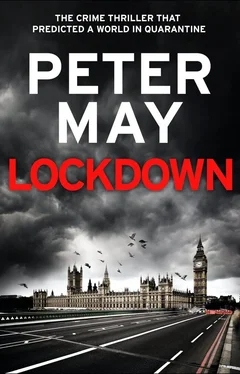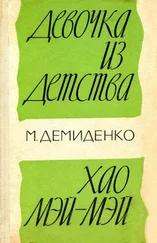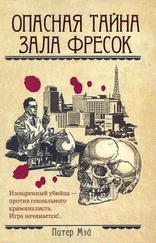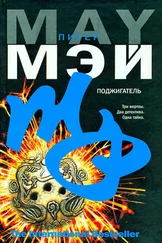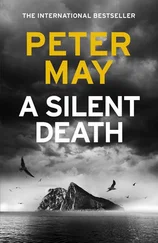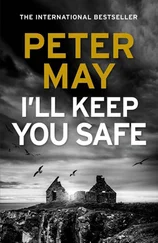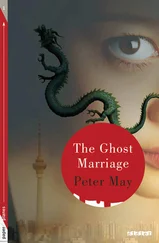Pinkie sat in his car fifty yards away watching the lights burning in the windows of Flight’s apartment. He wondered what MacNeil was doing in there, what delights he had discovered, what secrets uncovered. He had been so preoccupied with Flight’s little house of horrors on the first floor that it had been a simple enough matter for Pinkie to creep silently down to the front door and out into the night. He tried to imagine MacNeil’s surprise when he went upstairs and found Flight waiting for him. Pinkie had been unable to resist the temptation to arrange the sculptor in welcoming pose on his expensive leather chair. If MacNeil had come straight up, well then, he’d simply have had to shoot him. Even at the risk of Mr Smith’s ire. Irritatingly, Flight’s head had refused to play ball and kept falling forward, and Pinkie had felt compelled finally, for reasons of self-preservation, to leave before he was satisfied.
His mobile phone purred on the seat beside him. He picked it up and looked at the display. Jonathan Flight , it said, and he dropped it again, as if it were contaminated. It couldn’t be Flight. He’d just killed him. He felt goosebumps rise up all across his neck and shoulders, before forcing himself to think logically. It couldn’t be Flight. But it was someone calling from Flight’s phone. So it had to be MacNeil. Where in the name of God had he got the number? Flight must have kept it in an address book, or in the memory of his phone. But how would MacNeil know to call it? Pinkie was spooked.
Tentatively he picked up the phone and pressed the green button to take the call. He put it to his ear and listened and said nothing. ‘Hello?’ he heard MacNeil’s voice. ‘Hello?’ But still Pinkie said nothing. And then he grinned. Now it was MacNeil’s turn to be spooked.
MacNeil listened to the ambient silence. He could hear someone breathing, someone listening but saying nothing, almost as if they knew who was calling. He wanted to hang up, to cut off the presence that was so eloquent in its silence. But there was something compelling in it, and he sat for a full minute saying nothing. Just listening. He felt evil in the silence, and the longer he listened to it the more oppressive it became, until finally he couldn’t stand it any more, and he banged the receiver back in its cradle. He was shaking now, his mouth dry. He had the unnerving feeling that he had just had an encounter with the ghost that was haunting him, this killer of men and boys, and perhaps of a little Chinese girl with a cleft palate. And he had, too, the sense that this ghost was somewhere very close.
‘Scotland the Brave’ burst into jolly refrain, and MacNeil’s heart nearly hit the roof of his mouth. He fumbled in his pocket for his mobile and saw Amy’s name on the display.
‘Hey, Amy,’ he said, trying to sound as natural as he could.
‘What’s wrong?’
‘What do you mean?’
‘You sound weird.’
‘I’m just tired, Amy.’ He looked at his watch. It was after midnight. ‘You should be in bed.’
‘I can’t sleep. I wish I’d never brought the head home with me. It’s like she’s here in the house, that little girl. Haunting me. I can’t get her face out of my mind.’
Someone else, MacNeil thought, being haunted tonight.
‘How is it going?’
He knew he couldn’t tell her the truth. Someday, maybe, but not tonight. ‘I’ve got a couple of leads,’ he said. ‘I think she might have been murdered in a house near Wandsworth Common.’
‘My God, that’s more than a couple of leads. How did you get to that?’
‘Too complicated to go into now. How about you? Anything fresh? Any feedback from the lab?’
‘Actually, yes. Pretty strange, really, and I’ve no idea if it’s important or not. But she had the flu.’
MacNeil was taken aback. ‘Died of it?’
‘Impossible to tell. But she’d either had it and recovered, or she was suffering from it when she died.’
MacNeil thought about it. He had no idea, either, if there was any significance in it.
Then Amy said, ‘What’s weird about it, though, is that it wasn’t the H5N1 human variant that’s killing everyone else.’
MacNeil frowned. ‘I don’t understand.’
‘It was another variation on the H5N1 bird flu virus. A man-made one.’
Amy hung up and stared at the head gazing back at her in the dim lamplight of the attic sitting room. Her eye was drawn again to the cleft lip. It was as if the child had been caught on a fisherman’s hook and then thrown back, permanently disfigured, into an ocean in which she would always find herself swimming against the tide.
It could just as easily have been Amy. Some tiny glitch in the genetic code determining the course of a life, separating the smart from the stupid, the beautiful from the ugly. Amy was both smart and beautiful. It wasn’t a genetic glitch which had determined the course of her life, it was a drunk behind the wheel of a car, and five seconds of madness.
They had other things in common, though — Amy and Lyn. A racial inheritance, perhaps even a cultural one. A girl born into poverty in China had little chance. Amy knew it only too well. She had been born in England, not China. She had been born into relative affluence, not poverty. But thousands of years of cultural preference for a son, rather than a daughter, had been hard for her parents to shake off. She had been the first born, but it was her younger brother, when he arrived, who had taken pride of place.
Had she been born in impoverished rural China, she may well have ended up in an orphanage, like millions of her peers. Abandoned by her family on the doorstep of a police station somewhere, so that they might try again for a son. The Chinese government policy of one child per family meant there were no second chances — unless you lived in the city, had money and knew how to buy your way around the system.
For as long as anyone could remember, in Chinese society, when the son married he brought his wife to live with his parents. And when the parents grew old, it was the responsibility of the son and his wife to look after them. But if you had a daughter, she would leave to look after her husband’s parents, and you would have to fend for yourself in your old age. So it was little wonder that boys were prized and girls despised.
Amy wondered if it had been Lyn’s fate to end up in an orphanage somewhere, unloved, unwanted, even by childless Western couples desperate to adopt — her deformity always working against her. And yet, here she was — or had been — living in London, this bastion of Western affluence and privilege. But only to meet a fate worse than any orphanage, murdered and hacked up and dumped in a hole in the ground.
A wwwooo-oop sound turned Amy’s head towards her computer. The window of her most recent conversation with Sam was still up on the screen. And now Sam had sent a new message. Amy manoeuvred her wheelchair over to the desk to see what Sam was saying.
— Amy, are you still around?
The cursor blinked with endless patience, awaiting Amy’s response.
— Hi, Sam. Yeah, I’m still up. It’s late.
— I couldn’t sleep for thinking about your little girl.
— Me neither. She keeps staring at me.
— It’s a terrible thing when you can put a face to someone, but not a name, or a history. I wish I could see her, too.
— I could take a photo of the head and email it to you.
— Maybe in the morning. The cursor blinked for a bit. Then — How is Jack holding up?
— I don’t know. He sounded pretty weird when I spoke to him last. I think he’s throwing himself into this investigation just to stop himself thinking.
Читать дальше
